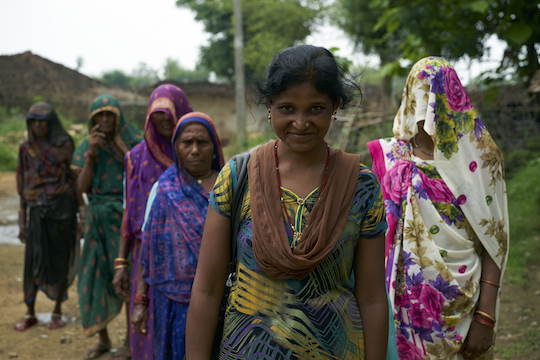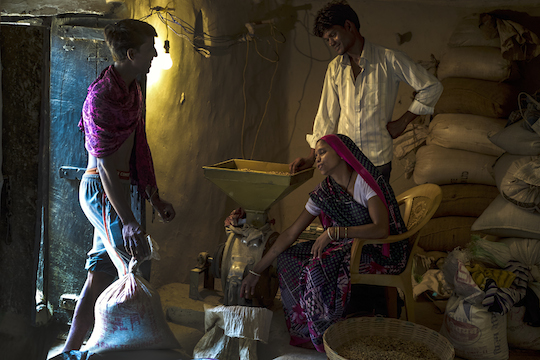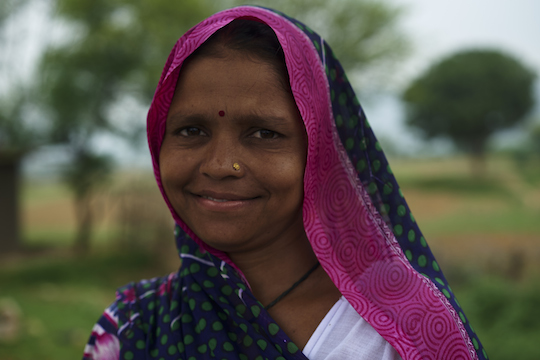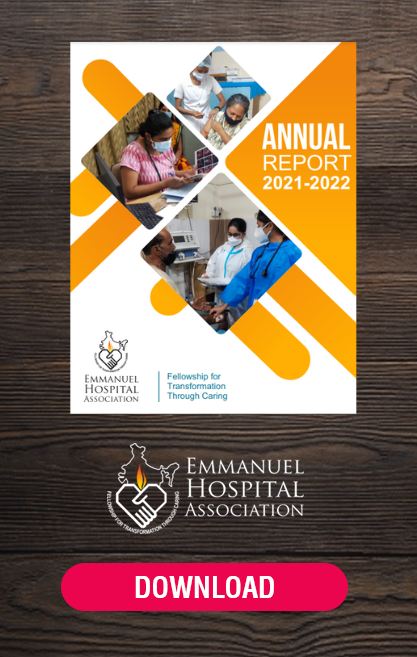 Electricity poles but no supply
Electricity poles but no supply
Surrounded by high hills on one side and a river on the other, the villagers of Piprahi are cut off. The nearest village is 2km away on the other side of the river. However, there’s no bridge and so it’s difficult for anyone to reach them.
The villagers were therefore delighted when, back in 2012, they were told that they would be connected to the electricity grid under a government scheme. However, after the electricity poles had been erected, the contractors asked the villagers for extra money to finish the job, which they couldn’t pay.
“It was an odd sight,” recalls Ram Naresh Kori, one of the community members. “Electricity poles had been put up in the village like lollipops; what was missing was the electricity supply. Every time we went to the electricity department to ask how far the matter had progressed, they gave us vague and evasive answers and sent us on our way.”
Remote, neglected and cut off
Piprahi’s remoteness is part of the reason why the village is neglected by service providers – it’s just too difficult to get to.
However… there’s another reason. 90% of the families who live in Piprahi belong to Scheduled Castes. Discrimination against people from Scheduled Castes – otherwise known as dalits – has been happening for centuries. Although the caste system was abolished in 1950, dalits are still looked down upon and discriminated against in Indian society. And Piprahi’s two year wait for electricity is a case-in-point…
“The women and children were the most affected by lack of electricity supply in the village,” explains Sandhya Gupta – the Community Organiser for EHA. “Children could not study after dark while the women found it difficult to finish their domestic chores.”
Asha Kori, the Sarpanch (Village Head) of Piprahi also recalls how cut off they felt: “When there was no electric supply, very often our mobiles would run out of battery power - we had to travel to distant villages and carry dozens of mobiles with us for charging. For days on end, we were cut off from the outside world. This was very significant for families where members were unwell, women were in labour or any other emergency.”

Sandhya Gupta from EHA stands alongside some of the women from the village.
Support to lodge an official complaint
Through the PACS programme, EHA started working in the village, helping to set up a Community Based Organisation called Nigrani Samiti (Watch Committee). Tired of asking the department for answers about their electricity connection, this was the first thing on the agenda!
Ram – one of the Nigrani Samiti members – was supported by EHA to register the village’s complaint on the Chief Minister’s Helpline.
Within 4 days of lodging his complaint, the Madhya Pradesh Electricity Board called him back and confirmed receipt of the complaint. More importantly, the company spokesperson reaffirmed that work on the electric supply would start within 4 days.
Sure enough, as promised, work resumed and the village was electrified in 2014, with each household getting an electric point.
Positive impacts
Along with the ability to charge their mobile phones to stay connected to the outside world, one of the biggest impacts of electrifications has been the set-up of an atta chakki (flour mill) in the village by a local entrepreneur.
Gori Kori – the President of Nigrani Samiti – says, “Before, we had to set apart an entire day to travel on motorcycles or bicycles to get flour and, because of the distance, many people could carry only 10kg, greatly limiting the amount of flour they had at home. This meant either that they had to ration their food intake or they had to travel frequently to get flour, adding to their cost and hassle.”

Thanks to the electric mill, the villagers now have a regular and local supply of flour for making their chappati (bread).
Thanks to the work of PACS and EHA, the village now has an electric flour mill, which saves time, energy and money as the villagers no longer have to travel long distances to buy their flour.
Women’s empowerment
However, for the women, the setting-up of Nigrani Samiti has been transformative in an additional way.
“Women were never allowed outside their houses,” explains Kesh Kali – a female member of Nigrani Samiti. “They were not even allowed to talk in front of men or in their presence.”
Along with some other women, Kesh began to attend the meetings and programmes that EHA conducted. “‘Women could never be leaders’ was the reaction of many people in the village,” she recalls. “We expected this reaction…in fact, that is what kept us going and challenged us to do better.”
Addressing other issues
Thanks to the inclusion of women on the committee, issues affecting women and children have been addressed, such as the functioning of the village Anganwadi Centre under the Integrated Child Development Services (ICDS) scheme.
“There were no Midday Meal supplies at our Anganwadi Centre,” says Chhoti Pal – another female member. “We met the district Chief Executive Officer (CEO) and told him of our situation. When he seemed reluctant, we gave him an ultimatum. He called us back from the door as we were leaving and issued a written order to restore supplies to our Anganwadi.”
The group is now working to have a road built because accessibility to the village is very bad. “Pregnant women find it really difficult to go to the hospital even today because the ambulance cannot come into the village,” says another woman, Phuliya. “We are now working on a plan to have an all-weather road built right to our village so that accessibility is much better. If we can get electricity, can a road be very far behind?”

Gori Kori is the leader of Nigrani Samiti – the Community Based Organisation set up by PACS and EHA. Thanks to the inclusion and leadership of women, issues that affect them in the village are now addressed.
Title: Let There Be Light!
Sub-title: A dalit village gets electricity after 2 years.
Date story collected: 21 July 2015



